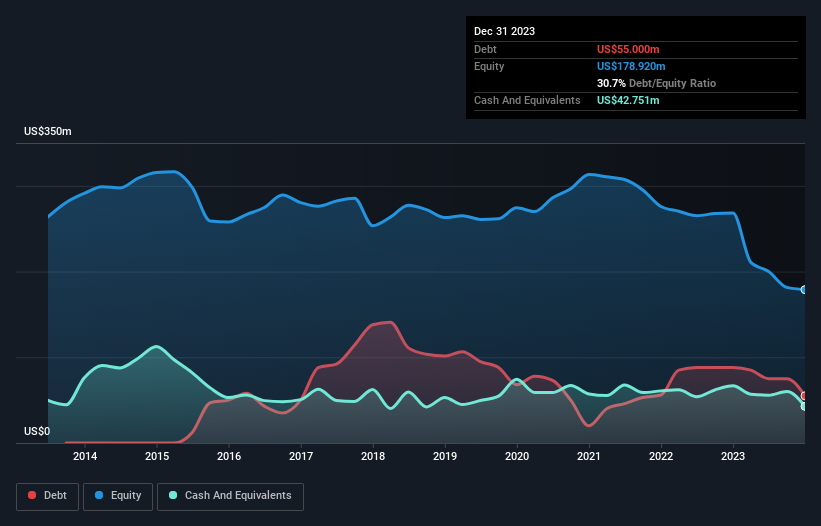- United States
- /
- Consumer Durables
- /
- NasdaqGS:UEIC
Is Universal Electronics (NASDAQ:UEIC) Using Too Much Debt?
The external fund manager backed by Berkshire Hathaway's Charlie Munger, Li Lu, makes no bones about it when he says 'The biggest investment risk is not the volatility of prices, but whether you will suffer a permanent loss of capital.' So it seems the smart money knows that debt - which is usually involved in bankruptcies - is a very important factor, when you assess how risky a company is. As with many other companies Universal Electronics Inc. (NASDAQ:UEIC) makes use of debt. But the more important question is: how much risk is that debt creating?
When Is Debt A Problem?
Debt assists a business until the business has trouble paying it off, either with new capital or with free cash flow. Ultimately, if the company can't fulfill its legal obligations to repay debt, shareholders could walk away with nothing. While that is not too common, we often do see indebted companies permanently diluting shareholders because lenders force them to raise capital at a distressed price. Of course, debt can be an important tool in businesses, particularly capital heavy businesses. The first step when considering a company's debt levels is to consider its cash and debt together.
See our latest analysis for Universal Electronics
What Is Universal Electronics's Debt?
As you can see below, Universal Electronics had US$55.0m of debt at December 2023, down from US$88.0m a year prior. However, it also had US$42.8m in cash, and so its net debt is US$12.2m.

How Healthy Is Universal Electronics' Balance Sheet?
According to the last reported balance sheet, Universal Electronics had liabilities of US$161.1m due within 12 months, and liabilities of US$15.8m due beyond 12 months. Offsetting these obligations, it had cash of US$42.8m as well as receivables valued at US$120.5m due within 12 months. So its liabilities total US$13.7m more than the combination of its cash and short-term receivables.
Since publicly traded Universal Electronics shares are worth a total of US$145.7m, it seems unlikely that this level of liabilities would be a major threat. But there are sufficient liabilities that we would certainly recommend shareholders continue to monitor the balance sheet, going forward. The balance sheet is clearly the area to focus on when you are analysing debt. But it is future earnings, more than anything, that will determine Universal Electronics's ability to maintain a healthy balance sheet going forward. So if you're focused on the future you can check out this free report showing analyst profit forecasts.
Over 12 months, Universal Electronics made a loss at the EBIT level, and saw its revenue drop to US$420m, which is a fall of 23%. To be frank that doesn't bode well.
Caveat Emptor
Not only did Universal Electronics's revenue slip over the last twelve months, but it also produced negative earnings before interest and tax (EBIT). Its EBIT loss was a whopping US$24m. Considering that alongside the liabilities mentioned above does not give us much confidence that company should be using so much debt. So we think its balance sheet is a little strained, though not beyond repair. We would feel better if it turned its trailing twelve month loss of US$98m into a profit. So in short it's a really risky stock. For riskier companies like Universal Electronics I always like to keep an eye on whether insiders are buying or selling. So click here if you want to find out for yourself.
Of course, if you're the type of investor who prefers buying stocks without the burden of debt, then don't hesitate to discover our exclusive list of net cash growth stocks, today.
New: AI Stock Screener & Alerts
Our new AI Stock Screener scans the market every day to uncover opportunities.
• Dividend Powerhouses (3%+ Yield)
• Undervalued Small Caps with Insider Buying
• High growth Tech and AI Companies
Or build your own from over 50 metrics.
Have feedback on this article? Concerned about the content? Get in touch with us directly. Alternatively, email editorial-team (at) simplywallst.com.
This article by Simply Wall St is general in nature. We provide commentary based on historical data and analyst forecasts only using an unbiased methodology and our articles are not intended to be financial advice. It does not constitute a recommendation to buy or sell any stock, and does not take account of your objectives, or your financial situation. We aim to bring you long-term focused analysis driven by fundamental data. Note that our analysis may not factor in the latest price-sensitive company announcements or qualitative material. Simply Wall St has no position in any stocks mentioned.
About NasdaqGS:UEIC
Universal Electronics
Designs, develops, manufactures, ships, and supports home entertainment control products, technology and software solutions, climate control solutions, wireless sensors and smart home control products, and audio-video accessories.
Flawless balance sheet and undervalued.
Similar Companies
Market Insights
Weekly Picks


Is this the AI replacing marketing professionals?

Pro Medicus: The Market Is Confusing a Lumpy Quarter With a Broken Business

The Rising Deal Risk That Helped Sink Netflix’s $72 Billion Bid for Warner Bros. Discovery

The Infrastructure AI Cannot Be Built Without
Recently Updated Narratives


Realty Income - A Fundamental and Historical Valuation

A Structured Counter‑Analysis of "The Leaking Dreadnought"


Alphabet Inc. (GOOG): The Gemini Era – Consolidating AI Dominance in 2026.
Popular Narratives


Is Ubisoft the Market’s Biggest Pricing Error? Why Forensic Value Points to €33 Per Share

Nu holdings will continue to disrupt the South American banking market





